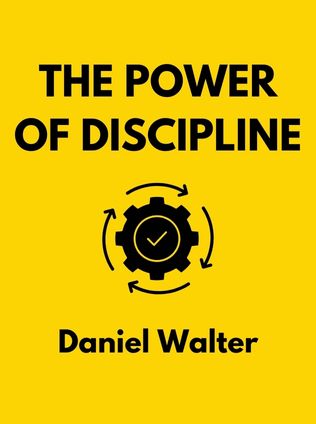
The Power of Discipline
How to Use Self Control and Mental Toughness to Achieve Your Goals
By Daniel Walter
Published 05/2020
About the Author
Daniel Walter, a Canadian author with a degree in cognitive neuroscience from Yale University, has dedicated his career to understanding and explaining the complexities of the human mind. His works focus on improving key aspects of personal development, including focus, habits, and memory. Walter's insights into the mind are informed by both his academic background and his passion for helping others achieve their full potential. Among his well-known works are Habits for Success, How to Stop Procrastinating, and The Productivity Blueprint. His book, The Power of Discipline, encapsulates his approach to overcoming the internal and external barriers that prevent us from achieving our goals, emphasizing the pivotal role of self-discipline in personal success.
Main Idea
In The Power of Discipline, Daniel Walter explores the critical role of self-discipline in achieving success. The central thesis of the book is that self-discipline, the ability to act in one's best interest despite temptations and distractions, is not an innate talent but a skill that can be developed and strengthened over time. Walter argues that by understanding and combating the biological tendencies that hinder self-discipline, such as the craving for consistency and the tendency to procrastinate, individuals can cultivate habits that support discipline and lead to long-term success. The book serves as both a guide and a practical manual for anyone looking to enhance their self-discipline and, by extension, their ability to reach their full potential.
Table of Contents
- Introduction: The Importance of Self-Discipline
- Understanding Self-Discipline
- The Biological Barriers to Self-Discipline
- Craving Consistency: The Comfort Zone Trap
- Overestimating Personal Abilities: The Dunning-Kruger Effect
- Procrastination: The Silent Killer of Productivity
- Setting Unrealistic Expectations
- Building the Habits of Self-Discipline
- Conclusion: The Path to Mastery
Introduction: The Importance of Self-Discipline
Self-discipline is often viewed as a harsh taskmaster, a relentless force that drives people to work beyond their limits. However, Walter reframes it as the foundation of all success, a skill that enables individuals to make healthy and productive choices, resist temptations, and remain committed to their goals. He highlights that self-discipline is not just about resisting temptations; it's about consistently making choices that align with long-term success.
“Self-discipline is the ability to act in your best interests despite temptations.” — Daniel Walter
Understanding Self-Discipline
Walter begins by defining self-discipline as the ability to make decisions that are in one's best interest, even when faced with immediate gratification that might derail long-term goals. He stresses that self-discipline is essential for committing to goals, developing good habits, and working hard consistently. Unlike motivation, which is fleeting and often dependent on external factors, self-discipline is a reliable and sustainable force that propels us forward even when motivation wanes.
The Biological Barriers to Self-Discipline
The core of Walter's argument lies in identifying and overcoming the biological tendencies that impede self-discipline. He identifies four key barriers: craving consistency, overestimating personal abilities, procrastination, and setting unrealistic expectations. These tendencies are hardwired into our biology, making the practice of self-discipline challenging but not impossible.
Craving Consistency: The Comfort Zone Trap
One of the most pervasive barriers to self-discipline is the human tendency to crave consistency. This craving is rooted in our desire for comfort and fear of loss or failure. Walter explains that this need for consistency often keeps us stuck in our comfort zones, resisting the very changes that could lead to significant personal growth and success.
Sign up for FREE and get access to 1,400+ books summaries.
You May Also Like
The Subtle Art of Not Giving a F*ck
A Counterintuitive Approach to Living a Good Life
By Mark MansonRich Dad Poor Dad
What the Rich Teach Their Kids About Money - That the Poor and Middle Class Do Not!
By Robert T. KiyosakiHow To Win Friends and Influence People
The All-Time Classic Manual Of People Skills
By Dale CarnegieFreakonomics
A Rogue Economist Explores the Hidden Side of Everything
By Steven D. Levitt and Stephen J. Dubner



















